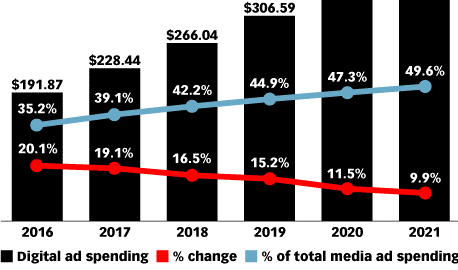State of Digital Marketing – Priorities, Challenges, Trends and More
In today’s connected, always-on world, over 4.33 billion people are now active internet users, which is about 56% of the global population. And this number only continues to grow. Interacting with friends, family and brands through social, mobile and digital channels is very much the norm.
For marketers, connecting with audiences is about meeting them where they are located – and today, this is on digital and mobile channels. As digital continues to evolve, the role of digital marketing is also expanding.
In recent research by Altimeter, digital marketers were asked to rank their top priorities. According to the study, the top three responses were:
- Using more data to create customized content that serves the customer journey (51%)
- Investing in technology that enables real-time delivery and personalization of data (50%)
- Hiring more creative skills to scale content in new interactive formats (48%)
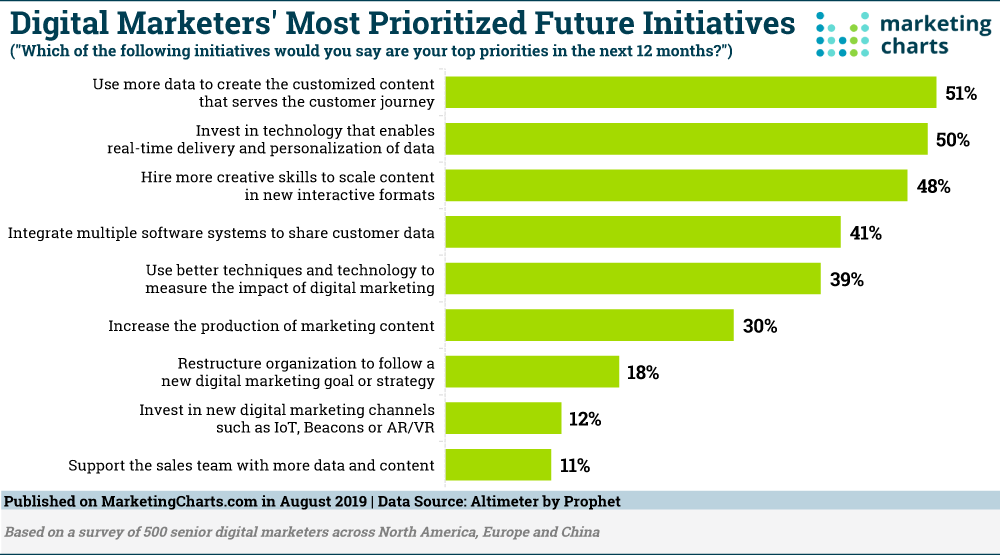
What Determines Digital Marketing Success?
So how do digital marketers determine if their strategies are successful? For 61% of respondents, customer loyalty and customer lifetime value were top metrics used to measure success. Additionally, responses included direct revenue (55%), brand awareness (48%), leads generated or converted (47%) and customer acquisition (44%).
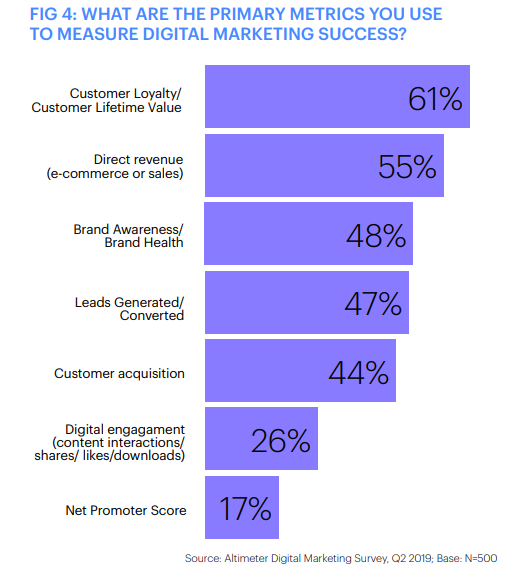
Challenges to Success
With digital marketing becoming more widely used, digital marketing professionals are also in higher demand. Hiring people with the necessary digital skills was cited as the top challenge for 55% of survey respondents. Other top challenges included hiring scaling marketing innovation across business units (54%), proving the business impact of digital marketing (47%), purchasing or integrating the right software (46%), and getting investment/support from executive leadership (46%).
Digital Marketing Channels
Email continues to reign as the top performing marketing channel in terms of ROI, lead generation, content distribution and other key metrics. In research by the Manifest, almost 70% of businesses use email marketing as part of their campaign strategy. Other key findings:
- Among businesses that participate in email marketing, most send marketing emails either daily (32%) or weekly (41%).
- Businesses send a variety of emails, but product/company updates (69%), promotional emails (69%), newsletters, (68%), and event invitations (65%) are the most popular.
- When asked about their main goal for email marketing, most businesses want to grow and retain their customer base (29%) or increase engagement (22%).

– Social Media
As with all marketing channels, social media is continually evolving. Since it was first introduced, it is continuing to grow, providing tremendous opportunities for brands to reach their customer base. In fact, according to one research study by PwC, social networks are the biggest source of inspiration for consumer purchases with 37% of consumers finding purchase inspiration through the channel.
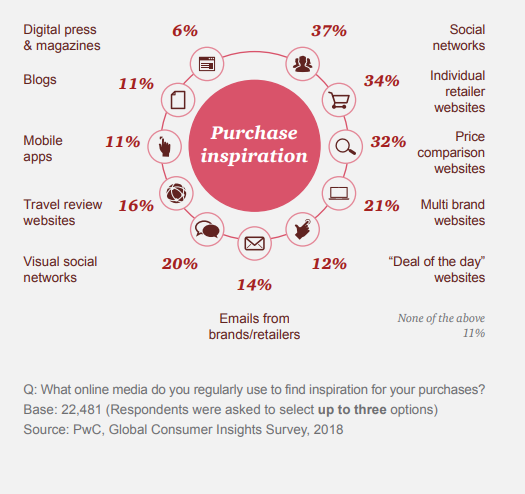
Additionally,
- Emarketer estimated that the ad spending on social video in the US increased by 38.1% during 2018, reaching $ 7.85 billion.
- Social media is the most relevant advertising channel for 50% of Gen Z and 42% of millennials.
- Non-customers are three times more likely than customers to visit retailers from social media ads.
- 50% of consumers said that seeing user-generated content would increase their chances of buying products through a brand’s social media. 49% said that easy payment systems (like Amazon Pay) would increase their chances of buying through social media.
- Posts with links to more information are the most preferred type of content on social media. 30% of consumers said that it’s the content they like to see most from brands on social. 18% preferred graphics and images, while 17% would like to see produced video. (Sprout Social)
– Digital Advertising
Digital advertising includes promotional advertisements delivered through email, social media websites, online advertising on search engines and banner ads on mobile or web sites. To better understand the online advertising landscape, here’s a look at some interesting statistics:
- Native advertising was the fastest-growing advertising segment, with 35 percent growth between 2017 and 2018. (eMarketer)
- Native ads receive 53 percent more views than traditional display ads. (Sharethrough)
- Appearing in mobile search ad results can increase brand awareness by 46%. (Wordstream)
- 64% of consumers will click on a Google ad when they are looking to buy items online. (Lyfe Marketing)
- Worldwide digital ad spend is expected to reach over $ 375 billion by 2021. (Lyfe Marketing)
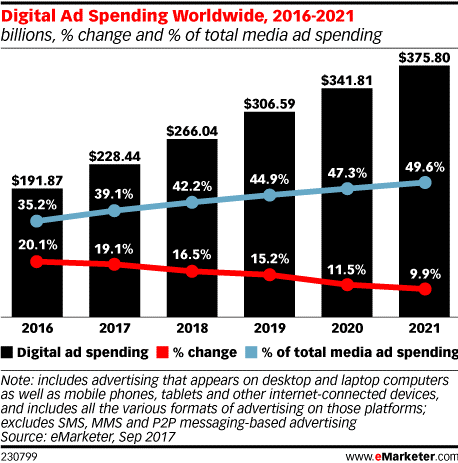
Some key trends to this year include the following:
Digital Video
Digital video ad spend continues to climb, according to IAB’s 2019 Video Advertising Spend Report. Marketers report digital budgets have increased 25% year over year. Approximately 86% of marketers are using video content in their campaign outreach efforts.
Native Advertising
Advertisers are spending big on native advertising. These ads emulate the look and feel of the media format where they appear, gaining greater acceptance and engagement because they are designed to seamlessly integrate into social feeds and websites versus banners or pop-ups.
Mobile Advertising
Mobile advertising shows no signs of slowing down, In 2018, mobile’s share of the U.S. digital ad market climbed to 63 percent of total digital ad spending. Over 55% of the US population regularly watches video on mobile, and the average smartphone video viewer is estimated to have spent 44 minutes watching videos on their device in 2018. Table users spent 38 minutes. Now in 2019, mobile is predicted to “surpass TV as the medium attracting the most minutes.”
Marketing requires that brands meet consumers on the channels they are using and more often than not, these interactions are taking place online. Digital marketers must stay current with trends, tactics and technology to achieve marketing goals and attain success.
Interesting in learning more about marketing strategies and tactics to help you boost your marketing strategies? Download our free customer experience ebook.
Free eBook: How to Optimize the Customer Experience
Digital & Social Articles on Business 2 Community
(80)
